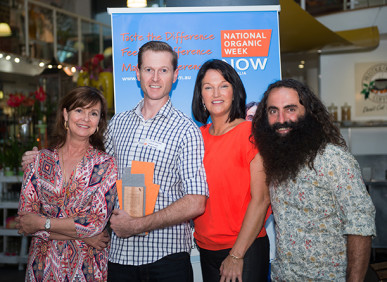Organic Crop Protectants (OCP) who sell the Eco-organic garden range of garden products has been voted the Best Organic Input Supplier at the 2013 Organic Consumer Choice Awards. The awards are run by The Centre for Organic Research & Education (CORE) as part of National Organic Week which is designed to increase awareness of the benefits of organic products.
It caps off a big year for OCP having won three other major awards earlier in the year. OCP is an Australian firm who work hard to produce organically certified products for the home gardener. I have used, like and recommend their HIPPO enhanced pest oil called Eco-oil (it not only kills pests but the natural oils included in the spray attract beneficial insects) and Eco-fungicide (made from activated potassium bicarbonate). I like the way they are open about their products and provide plenty of information and MSDS’s on their website.
I asked Steve Falconi, the General Manager of OCP why he sees organic approaches to gardening and farming as crucial to our world? Steve replied, “Organic gardening and farming is something which just makes sense. Its about respecting our environments and choosing to work with nature rather than against it. For all the toxic chemicals that have been used since the introduction of ‘modern’ petrochemical based pesticides and fertilisers we’ve not managed to eradicate a single horticultural pest or disease. What this modern approach has done is push our soils to the very edge with erosion and salinity being major problems nationwide. The organic approach however improves soil structure allowing them to hold more moisture, sequester carbon and boost biodiversity. You also get the added bonus of delicious produce which is nutritionally superior and chemical-residue free. Who wouldn’t prefer that?” I totally agree with Steve and think that OCP’s commitment to organic products and to finding safe ways to deal with problem pests and diseases is to be commended and supported.
One of the things that often puzzles me is why more producers don’t make a point of getting organic certification and instead go for the option of ‘Clean and Green’ or other general terms that hint at organic when the product actually isn’t organic. Organic certification means that every stage in the process of producing a product has been checked by the certifiers. This means packaging as well as the product inside the packet. It does cost more to produce certified organic products but surely it is better for everyone in the long run. Once again I asked for Steve’s take on the issue and why his company goes to the trouble and expense of getting certification Steve’s reply: The marketplace is flooded these days with products claiming to be organic, natural, green, safe etc… Unfortunately relaxed laws over the use of the word organic and clever marketing makes it increasingly difficult for the consumer to determine what is geniunely organic versus what is simply ‘greenwashing’. This is why Organic Certification is so important as it puts the power back in the hands of the consumer. Consumers can choose products which carry a Certified or Registered Organic logo and know they are getting the real deal. Independent certifying organisations will have assessed the product against a range of criteria and deemed it to be genuinely organic. Buying Certified Organic products allows customers to reward growers and manufacturers that are doing their bit to make our human footprint more sustainable on our fragile earth.” When advising gardeners, I always tell them to find a certified organic product to use. It is the only way to be sure that it really is organic and by buying these products we encourage producers to continue making them,

